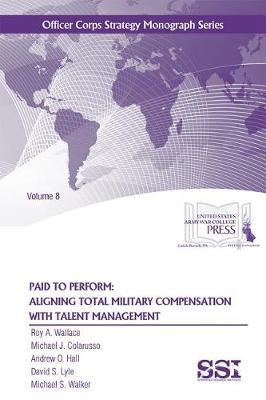Overview
Transforming the U.S. military's personnel management system is critical to long-run American national security interests, particularly as increasingly capable peer adversaries emerge. Talent management is critical to confronting these threats, particularly in an austere fiscal environment. This transformation cannot take place in a vacuum, however. As an extensive body of labor economics literature makes clear, total compensation management is an integral part of talent management. As the military changes the way it accesses, retains, develops, and employs its people, so, too, must it change the ways in which it compensates them. However, the current compensation system, rooted in industrial-era labor management practices, has outlived its usefulness. It is not linked to defined organizational outcomes, rests upon an ineffectual evaluation system, and does little to incentivize performance. Designed to complement an up or out personnel system that treats people as interchangeable parts, it has been rendered obsolete by dramatic changes in the American labor market, fiscal constraints, technological advances, and the changing nature of information age work. Using the Army's officer corps as a case study upon which a wider compensation model can be built, a system is proposed that integrates redesigned basic pays and pensions, monetizes nonpay benefits, and provides additional performance incentives in critical positions demanding organizational productivity. Audience: Personnel managers, human resources and benefits program department heads, military command leaders overseeing active duty commissioned officers, and armed forces reserve commands, plus compensation analysts, labor lobbyists, and economists may be interested in this work. Additionally military members interested in advancing in their military careers, Reserve personnel, and ROTC students may also have an interest in this work. Related Products: Starting Strong: Talent-Based Branching of Newly Commissioned U.S. Army Officers can be found here: https: //bookstore.gpo.gov/products/sku/008-000-01184-2 The Future Security Environment: Why the U.S. Army Must Differentiate and Grow Millennial Officer Talent is available here: https: //bookstore.gpo.gov/products/sku/008-000-01197-4 The Armed Forces Officer can be found here: https: //bookstore.gpo.gov/products/sku/008-000-01234-2 How We Fight: Handbook for the Naval Warfighter is available here: https: //bookstore.gpo.gov/products/sku/008-000-01149-4
Full Product Details
Author: Roy A Wallace ,
Strategic Studies Institute (U S ) ,
Michael J Colarusso ,
Br Andrew O Hall, PH D
Publisher: Department of the Army
Imprint: Department of the Army
Dimensions:
Width: 15.20cm
, Height: 0.60cm
, Length: 22.90cm
Weight: 0.142kg
ISBN: 9781584876922
ISBN 10: 1584876921
Pages: 67
Publication Date: 23 September 2015
Recommended Age: From 18 to 10 years
Audience:
General/trade
,
General
Format: Paperback
Publisher's Status: Active
Availability: Available To Order

We have confirmation that this item is in stock with the supplier. It will be ordered in for you and dispatched immediately.
Author Information
ABOUT THE AUTHORS ROY A. WALLACE, Senior Executive Service, is the Assistant Deputy Chief of Staff, Army G1. He was the Director of Plans and Resources, Deputy Chief of Staff, Army G-1 for 8 years prior to serving in his current position. Mr. Wallace retired from Active Duty as a Colonel in 2004. He has extensive experience in Army compensation and resourcing. Mr. Wallace holds a B.A. from the University of Arkansas and an M.B.A in comptrollership from Syracuse University. MICHAEL J. COLARUSSO is a retired Army lieutenant colonel who now serves as Senior Research Analyst in the U.S. Army's Office of Economic and Manpower Analysis (OEMA). His areas of research interest include organizational design, generational dynamics, human capital, and talent management. Lieutenant Colonel (Ret.) Colarusso holds a B.A. in history from Saint John's University and an M.A. in history from the Pennsylvania State University. ANDREW O. HALL is an Army colonel and the Chief of Military Personnel (Structure and Plans) for the Army G-1. He has served in Operations Research assignments at West Point, in XVIII Airborne Corps, and on the Army and Joint staffs. His areas of research interest include manpower analysis, applied probability, networks, and operations research. Colonel Hall holds a B.S. in computer science from West Point, an M.S. in applied mathematics from the Naval Postgraduate School, and a Ph.D. in management science and operations management from the Robert H. Smith School of Business at the University of Maryland. DAVID S. LYLE is an Army lieutenant colonel, the Director of the U.S. Army OEMA, and an Associate Professor of Economics in the Social Sciences Department at West Point, where he teaches econometrics and labor economics. His areas of research interest include labor economics, peer effects, human capital, and talent management. Lieutenant Colonel Lyle holds a B.S. from West Point and a Ph.D. in economics from the Massachusetts Institute of Technology. MICHAEL S. WALKER is an Army major, a research analyst in the Army's OEMA, and an Assistant Professor of Economics in the Social Sciences Department at West Point, where he teaches the capstone course in the Economics of National Security. His areas of research interest include defense economics, industrial organization, and talent management. Major Walker holds a B.S. from West Point and a Ph.D. in economics from the University of Oklahoma.




